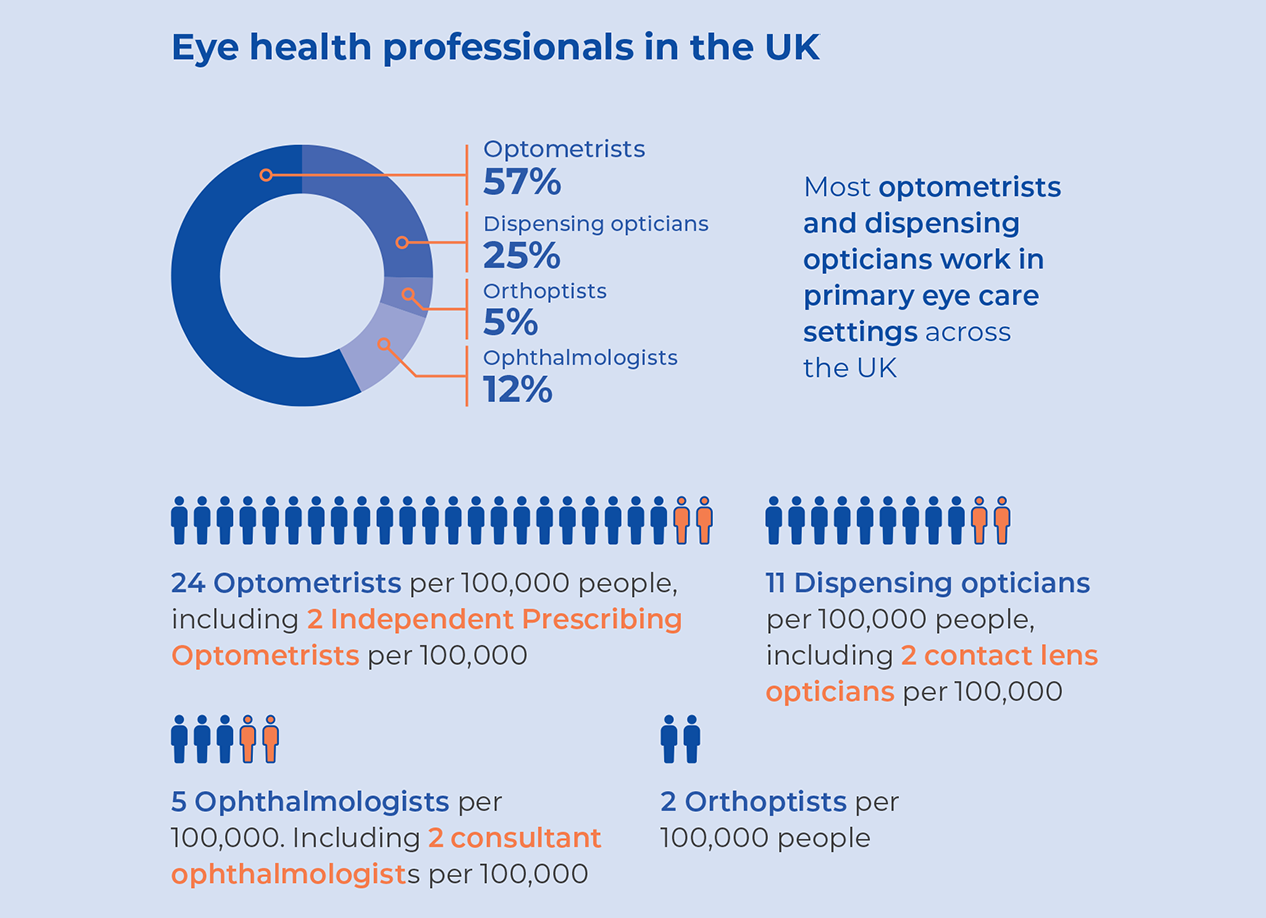- Primary eye care in Scotland provides more than 2.5 million appointments each year, including sight tests, enhanced eye care services and contact lens care appointments [1]
- Secondary care provides 446,000 appointments each year [2]
Scotland is the only country in the UK to provide NHS-funded eye examinations to all UK residents. The NHS provides universal access to this primary eye care service as part of General Ophthalmic Services (GOS) Scotland.
Optometrists in Scotland provide a range of NHS-funded eye care, but these services fall into three main groups. The GOS primary eye examination (PEE), supplementary eye examination (SEE) and enhanced supplementary eye examination (ESEE). These eye examinations are available nationally and enable patients with routine, chronic or emergency eye conditions to access an NHS-funded primary eye care service and be cared for locally and appropriately triaged.
Optometrists also provide locally commissioned services, learn more.
By making the best use of the eye care workforce, the primary eye care service in Scotland saves 370,000 people from attending hospital each year, according to research by Optometry Scotland.
As well as primary care, 14 NHS Boards in NHS Scotland are responsible for the Hospital Eye Service (HES).
FODO members provide most primary eye care services in Scotland and FODO Scotland works closely with Optometry Scotland to advance eye health and eye care across the whole of Scotland.
Optometrists and dispensing opticians comprise the largest regulated workforce in eye care, followed by ophthalmologists and orthoptists.*

Primary care optometrists are also qualified to manage a large and complex caseload. The table below provides an overview of the competencies and qualifications of primary care optometrists.
The section below provides an overview of eye health professionals and how they are regulated.
Regulated by the General Optical Council. Optometrists perform detailed eye examinations to detect defects in vision, ocular disease or other health issues. Many now also perform advanced diagnostic tests and co-manage patients with eye conditions. They form the single largest group of eye care professionals in the UK.
Dispensing opticians
Regulated by the General Optical Council. Dispensing opticians can fit and supply spectacles to children and adults and can advise on and dispense low vision aids. With additional specialist training they can also fit contact lenses and examine the anterior eye for defects and ocular disease.
Orthoptists
Regulated by the Health and Care Professions Council. Orthoptists specialise in diagnosing and treating visual problems involving eye movements. They might have other roles and responsibilities. They typically work in hospital eye clinics but can also work in community settings - for example, when screening in schools.
Ophthalmologists
Regulated by the General Medical Council. Ophthalmologists are medically trained doctors who specialise in eye health. They often do a mix of surgical and non-surgical work, and as they build more experience they typically specialise in a specific sub-speciality, with Health Education England noting eight subspecialty areas in 2019
- Cornea and anterior segment
- Medical retina
- Glaucoma
- Oculoplastic surgery (plastic surgery around the eye)
- Paediatric ophthalmology
- Surgical retina (vitreo-retinal surgeons)
- Primary care
- Medical and neuro-ophthalmology.
References
[1] FODO, The future of primary eye care - principles and priorities https://www.fodo.com/flipbooks/FODO-Strategy-Document-Full-2023/. Each year practices in Scotland provide more than 1.596 million sight tests, 586,000 enhanced eye care appointments and an estimated 320,00 contact less appointments (based on 8% of contact lens users in the UK living in Scotland and visiting at least once per year). Excluding visits for repeat tests and advanced diagnostics, a conservative estimate is that 2.5 million clinical appointments are offered each year.
[2] FODO, The future of primary eye care - principles and priorities https://www.fodo.com/flipbooks/FODO-Strategy-Document-Full-2023/.
*This shows the current split of the workforce within the UK.


 Patients and public
Patients and public
 Policymakers
Policymakers Members
Members News and views
News and views

